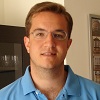
Letter From The Executive Director
Dr. Robert M. Panoff
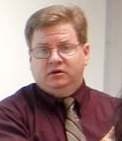
Pursuing the Joy of "Fun" + "Ding!"
One of the most challenging aspects of doing the work of Shodor is raising the funds that let us do what we do every day to improve math and science education. We are mentoring students so they can master 21st century workforce skills while growing into mature responsible users -and developers- of technology; we guide these students with our expertise as staff are building some of the leading interactive courseware to be found on the Web; and we are supporting teachers with effective content and technology professional development.
All of this takes more than $1 million dollars per year. The pursuit of funding is not an end in itself, but we have to pay the rent, pay staff, and pay for travel to help teachers across the country. As you can read in this issue, we have been very blessed by being able to secure some of the funds that we'll need for some of the projects for the next three years.
I should point out that almost all of the new funding is to spread the success of our student programs across the state of North Carolina. Some of these grant requests have taken more than a year to research, write, and negotiate. Still other grants will expire this year and need to be replaced, and that work has already started. It is an on-going effort, and we are grateful for the encouragement and support of the funding agencies who evaluate our proposals and who follow our work with great interest.
I am often asked how we decide which grants or opportunities to go after. Shodor isn't chasing dollars just because some state, federal, or private foundation has funds to support some kind of education activity. We look for funding opportunities that will enable us to extend our vision on the appropriate uses of computing and communication technologies in education, without inventing or pretending to invent new programs just to "go after" the funding.
For a project to merit the effort to get the funding, there has to proof of real engagement on the part of students and teachers, and we often can measure that engagement by asking if the learning (besides being hard work) at Shodor is fun. We also want to know that what we are doing has evidence of effectiveness, that is, that students really learn, that teachers see real impact, you know what I mean, when you can see the sparkle in a young person's eyes, or you can almost hear the little bell that goes "ding." So it takes evidence that we can have both the fun and the ding before we even start the effort to seek the funding for our work.
Thank you for your continued support and interest in our work!

Bob Panoff
University of Chicago Extends Teragrid Grant to Shodor
By Patrick Royal, Shodor Intern

Shodor has recently been awarded a $150,000 grant from the University of Chicago to continue their partnership with TeraGrid and High Performance Computing University (HPCU). As a part of this grant, Shodor will continue work to design, develop, and enhance the offerings of HPCU. Shodor hopes to use this opportunity to coordinate a series of workshops to support integration of computational science; parallel, distributed, and cluster computing; and advanced computational methods in the sciences.
TeraGrid is an open scientific discovery infrastructure that aims to link scientific sites around the country to create comprehensive databases of open scientific information. Currently, TeraGrid's resources include more than 2 petaflops of computing power and more than 50 petabytes of online and archival data storage split into more than 100 discipline-specific databases.
As a part of its grant, Shodor will work with TeraGrid to expand the offerings of the HPCU. New modes of services, searching, and discovery will be added to the online computing capability. Shodor will also work to provide catalog submission and posting capabilities to existing infrastructure. Resource reviews will be integrated and standardized in formal verification, validation, and accreditation (VV&A) process, as well as community reviews of the catalog entries. Moreover, Shodor will add resources from the petascale community in order to build continuity from terascale to petascale computing. As Shodor looks forward to building international collaborations, Shodor will begin to develop capabilities for mirror sites from multiple locations. More information on HPCU can be found at our website.
Shodor "Wellcomes" the Burroughs Wellcome Fund and the NSF Grant Awards
By DeMarcus Hill, Shodor Intern
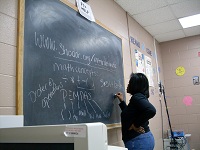
Shodor has been awarded two new grants, one from the Burroughs Wellcome Fund (BWF) and the other from theNational Science Foundation (NSF). These grants will total more than one million dollars and will offer Shodor the opportunity to expand its impact over North Carolina.
The BWF was founded in 1955, and is a private foundation dedicated to "advancing biomedical sciences by supporting research and other scientific and educational activities". BWF's primary goal is to help developing scientists early in their career, teaching them curiosity and good investigative skills. The BWF also awards grants to nonprofit organizations such as Shodor for "conducting activities intended to improve the general environment for science". The BWF will award Shodor $18,000 dollars over the next 3 years. Shodor will be using the BWF grants to develop computational science materials and train instructors in Carteret, Pamlico, and surrounding counties to teach Shodor workshops.
Shodor will also receive a grant from NSF for $875,000 over the next three years. NSF is a federal agency founded by Congress in 1950. NSF promotes the progress of science, and has an annual budget of $6.9 billion. NSF also funds about 20% of all federally supported research conducted by universities and colleges throughout the United States. The NSF grant awarded specifically to Shodor will fund the expansion of Shodor's Computing MATTERS workshops throughout Durham, Research Triangle Park and to span the state of North Carolina, working with Western Carolina University, East Carolina University, and UNC Charlotte. Computing MATTERS is a year round program for middle and high school students that are interested in computational sciences. Students learn authentic uses for computers in transforming science and mathematics education through the internet and network technologies observing real-time manipulation of data representations on a computer screen and seeing how the end results take shapes. These workshops help students build and sustain an interest in areas of science, technology, engineering, and mathematics.
Shodor Wins Durham Chamber of Commerce Business Excellence Award
By Hillary Stoker, Shodor Staff
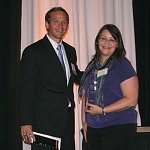
The Durham Chamber of Commerce held their annual Business Excellence Awards ceremony at the Hilton Hotel in Durham on Thursday September 9, 2010. More than 200 local business and community leaders were in attendance as the Chamber presented awards in six different categories.
Shodor was awarded the Business Excellence Award in the non-profit category. Shodor was chosen for this award, according to the Durham Chamber, because "Shodor has not only launched its revolutionary teaching approach in Durham, but has also expanded and perfected its methodologies though implementation activities in partnership with a host of Durham entities".
Shodor staff members Jennifer Houchins, Patricia Jacobs, Jack Parkin, and Valerie Gartland were all in attendance to accept the award. The Durham Chamber in partnership with Alfred P. Sloan Foundation's "When Work Works" project has previously honored Shodor; Shodor received the Sloan Award for Business Excellence in Workplace Flexibility in 2009 and 2006.
GoodSearch Can Help Shodor!
By Hillary Stoker, Shodor Staff
What if Shodor received a donation every time you searched the Internet? Or how about if a percentage of every purchase you made online went to supporting Shodor? Well, now it can! GoodSearch.com is a new Yahoo-powered search engine that donates half its advertising revenue, about a penny per search, to the charities and non-profits its users designate. Use it just as you would any search engine, get quality search results from Yahoo, and watch the donations add up! Just go to GoodSearch.com, click on "participating nonprofits", search for Shodor and click on the Shodor link. This will take you to a screen with prompts on how to download the GoodSearch toolbar. And if you download the GoodSearch - Shodor toolbar, Shodor will earn money every time you shop and search online - even if you forget to go to GoodShop or GoodSearch first! Add the GoodSearch/Shodor toolbar at www.goodsearch.com/toolbar/mode/.
Shodor Staff Member Elected to Symphony Board
By most everyone in the Triangle area is aware of the North Carolina Symphony headquartered in Raleigh. Not as well known, but an increasingly influencing presence in the Durham artistic scene, is the Durham Symphony Orchestra. Founded 35 years ago, the orchestra has invigorated itself with the recent appointment of William Henry Curry as its musical director. This change has resulted in an emphasis in American composers and their works' relationship to the European symphonic masters in the musical selection of the orchestra's performances. Additionally, the orchestra has recently expanded its board of directors and has elected Shodor's Business Development Director, Jack Parkin to its ranks. Parkin has decades-long involvement with musical performances, starting out as an early "rock-and-rolling" tenor saxophone player, member of a U.S. Navy marching band, oboist in summer stock productions of Brigadoon, church choir director, and a long-standing member of the Society for the Preservation and Encouragement of Barbershop Quartet Singing in America (SPBQSA), performing in Danbury Connecticut's Madhatters Barbershop Chorus and Berkshire Connection quartet. Parkin's wife, Dr. Elizabeth Smith, is a recent past president of the Pensacola Symphony.
Parkin is especially pleased that the Durham Symphony, like Shodor, has historically encouraged and supported the young people of the Durham area. The orchestra has recently become a sponsor of KidZNotes, a program that aims to use classical music to inspire learning and break the cycle of poverty. Using funds provided by Duke University, KidZNotes recently gave violins to 60 Durham elementary school children and will be providing free lessons, along with mentoring by members of the Durham Symphony. So, if you see Parkin in the office wearing a tuxedo, he isn't trying to change Shodor's dress code, he's just rushing off after work to another symphony performance or speaking on behalf of the organization.
New Staff Bio
Rob Hochberg - Computational Mathematician
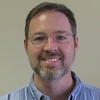
Rob Hochberg joins Shodor after teaching for fifteen years at the university level. He holds a doctorate in mathematics from Rutgers University, and a more recent masters in computer science from North Carolina State University. His research interests include algorithms development in mathematics and computational biology, with publications in math, biology and computer science journals. He has long experience in developing and presenting workshops in all of these areas for pre- and in-service teachers, an activity he enjoys immensely. He is married to Valerie DeBellis, a long time Shodor collaborator, owner of the teacher-training company Discrete Teaching, and author of several books on the teaching of discrete mathematics. They have two daughters; Mary, 10, and Elizabeth, 7.
